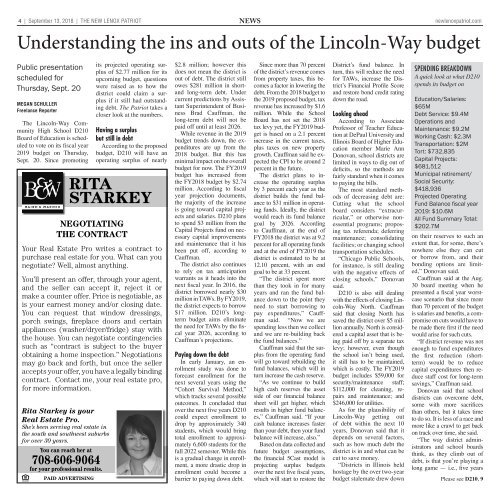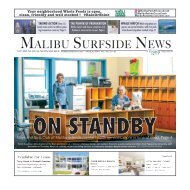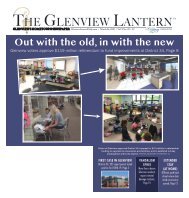You also want an ePaper? Increase the reach of your titles
YUMPU automatically turns print PDFs into web optimized ePapers that Google loves.
4 | September 13, 2018 | The New Lenox Patriot News<br />
newlenoxpatriot.com<br />
Understanding the ins and outs of the Lincoln-Way budget<br />
Public presentation<br />
scheduled for<br />
Thursday, Sept. 20<br />
Megan Schuller<br />
Freelance Reporter<br />
The Lincoln-Way Community<br />
High School D210<br />
Board of Education is scheduled<br />
to vote on its fiscal year<br />
2019 budget on Thursday,<br />
Sept. 20. Since promoting<br />
RITA<br />
STARKEY<br />
NEGOTIATING<br />
THE CONTRACT<br />
Your Real Estate Pro writes a contract to<br />
purchase real estate for you. What can you<br />
negotiate? Well, almost anything.<br />
You’ll present an offer, through your agent,<br />
and the seller can accept it, reject it or<br />
make a counter offer. Price is negotiable, as<br />
is your earnest money and/or closing date.<br />
You can request that window dressings,<br />
porch swings, fireplace doors and certain<br />
appliances (washer/dryer/fridge) stay with<br />
the house. You can negotiate contingencies<br />
such as “contract is subject to the buyer<br />
obtaining a home inspection.” Negotiations<br />
may go back and forth, but once the seller<br />
accepts your offer, you have a legally binding<br />
contract. Contact me, your real estate pro,<br />
for more information.<br />
Rita Starkey is your<br />
Real Estate Pro.<br />
She’s been serving real estate in<br />
the south and southwest suburbs<br />
for over 30 years.<br />
You can reach her at<br />
708-606-9064<br />
for your professional results.<br />
PAID ADVERTISING<br />
its projected operating surplus<br />
of $2.77 million for its<br />
upcoming budget, questions<br />
were raised as to how the<br />
district could claim a surplus<br />
if it still had outstanding<br />
debt. The Patriot takes a<br />
closer look at the numbers.<br />
Having a surplus<br />
but still in debt<br />
According to the proposed<br />
budget, D210 will have an<br />
operating surplus of nearly<br />
$2.8 million; however this<br />
does not mean the district is<br />
out of debt. The district still<br />
owes $281 million in shortand<br />
long-term debt. Under<br />
current predictions by Assistant<br />
Superintendent of Business<br />
Brad Cauffman, the<br />
long-term debt will not be<br />
paid off until at least 2026.<br />
While revenue in the 2019<br />
budget trends down, the expenditures<br />
are up from the<br />
2018 budget. But this has<br />
minimal impact on the overall<br />
budget for now. The FY2019<br />
budget has increased from<br />
the FY2018 budget by $2.74<br />
million. According to fiscal<br />
year projection documents,<br />
the majority of the increase<br />
is going toward capital projects<br />
and salaries. D210 plans<br />
to spend $3 million from the<br />
Capital Projects fund on necessary<br />
capital improvements<br />
and maintenance that it has<br />
been put off, according to<br />
Cauffman.<br />
The district also continues<br />
to rely on tax anticipation<br />
warrants as it heads into the<br />
next fiscal year. In 2016, the<br />
district borrowed nearly $30<br />
million in TAWs. By FY2019,<br />
the district expects to borrow<br />
$17 million. D210’s longterm<br />
budget aims eliminate<br />
the need for TAWs by the fiscal<br />
year 2026, according to<br />
Cauffman’s projections.<br />
Paying down the debt<br />
In early January, an enrollment<br />
study was done to<br />
forecast enrollment for the<br />
next several years using the<br />
“Cohort Survival Method,”<br />
which tracks several possible<br />
outcomes. It concluded that<br />
over the next five years D210<br />
could expect enrollment to<br />
drop by approximately 340<br />
students, which would bring<br />
total enrollment to approximately<br />
6,600 students for the<br />
fall 2022 semester. While this<br />
is a gradual change in enrollment,<br />
a more drastic drop in<br />
enrollment could become a<br />
barrier to paying down debt.<br />
Since more than 70 percent<br />
of the district’s revenue comes<br />
from property taxes, this becomes<br />
a factor in lowering the<br />
debt. From the 2018 budget to<br />
the 2019 proposed budget, tax<br />
revenue has increased by $1.6<br />
million. While the School<br />
Board has not set the 2018<br />
tax levy yet, the FY2019 budget<br />
is based on a 2.1 percent<br />
increase in the current taxes,<br />
plus taxes on new property<br />
growth. Cauffman said he expected<br />
the CPI to be around 2<br />
percent in the future.<br />
The district plans to increase<br />
the operating surplus<br />
by 3 percent each year as the<br />
district builds the fund balance<br />
to $31 million in operating<br />
funds. Ideally, the district<br />
would reach its fund balance<br />
goal by 2026. According<br />
to Cauffman, at the end of<br />
FY2018 the district was at 9.2<br />
percent for all operating funds<br />
and at the end of FY2019 the<br />
district is estimated to be at<br />
12.10 percent, with an end<br />
goal to be at 33 percent.<br />
“The district spent more<br />
than they took in for many<br />
years and ran the fund balance<br />
down to the point they<br />
need to start borrowing to<br />
pay expenditures,” Cauffman<br />
said. “Now we are<br />
spending less then we collect<br />
and we are re-building back<br />
the fund balances.”<br />
Cauffman said that the surplus<br />
from the operating fund<br />
will go toward rebuilding the<br />
fund balances, which will in<br />
turn increase the cash reserve.<br />
“As we continue to build<br />
high cash reserves the asset<br />
side of our financial balance<br />
sheet will get higher, which<br />
results in higher fund balances,”<br />
Cauffman said. “If your<br />
cash balance increases faster<br />
than your debt, then your fund<br />
balance will increase, also.”<br />
Based on data collected and<br />
future budget assumptions,<br />
the financial 5Cast model is<br />
projecting surplus budgets<br />
over the next five fiscal years,<br />
which will start to restore the<br />
District’s fund balance. In<br />
turn, this will reduce the need<br />
for TAWs, increase the District’s<br />
Financial Profile Score<br />
and restore bond credit rating<br />
down the road.<br />
Looking ahead<br />
According to Associate<br />
Professor of Teacher Education<br />
at DePaul University and<br />
Illinois Board of Higher Education<br />
member Marie Ann<br />
Donovan, school districts are<br />
limited in ways to dig out of<br />
deficits, so the methods are<br />
fairly standard when it comes<br />
to paying the bills.<br />
The most standard methods<br />
of decreasing debt are:<br />
Cutting what the school<br />
board considers “extracurricular,”<br />
or otherwise nonessential<br />
programs; proposing<br />
tax referenda; deferring<br />
maintenance; consolidating<br />
facilities; or changing school<br />
transportation schedules.<br />
“Chicago Public Schools,<br />
for instance, is still dealing<br />
with the negative effects of<br />
closing schools,” Donovan<br />
said.<br />
D210 is also still dealing<br />
with the effects of closing Lincoln-Way<br />
North. Cauffman<br />
said that closing North has<br />
saved the district over $5 million<br />
annually. North is considered<br />
a capital asset that is being<br />
paid off by a separate tax<br />
levy; however, even though<br />
the school isn’t being used,<br />
it still has to be maintained,<br />
which is costly. The FY2019<br />
budget includes $59,000 for<br />
security/maintenance staff;<br />
$112,000 for cleaning, repairs<br />
and maintenance; and<br />
$246,000 for utilities.<br />
As for the plausibility of<br />
Lincoln-Way getting out<br />
of debt within the next 10<br />
years, Donovan said that it<br />
depends on several factors,<br />
such as how much debt the<br />
district is in and what can be<br />
cut to save money.<br />
“Districts in Illinois held<br />
hostage by the over two-year<br />
budget stalemate drew down<br />
Spending breakdown<br />
A quick look at what D210<br />
spends its budget on<br />
Education/Salaries:<br />
$65M<br />
Debt Service: $9.4M<br />
Operations and<br />
Maintenance: $9.2M<br />
Working Cash: $2.3M<br />
Transportation: $2M<br />
Tort: $732,835<br />
Capital Projects:<br />
$681,512<br />
Municipal retirement/<br />
Social Security:<br />
$418,936<br />
Projected Operating<br />
Fund Balance fiscal year<br />
2019: $10.6M<br />
All Fund Summary Total:<br />
$202.7M<br />
on their reserves to such an<br />
extent that, for some, there’s<br />
nowhere else they can cut<br />
or borrow from, and their<br />
bonding options are limited,”<br />
Donovan said.<br />
Cauffman said at the Aug.<br />
30 board meeting when he<br />
presented a fiscal year worstcase<br />
scenario that since more<br />
than 70 percent of the budget<br />
is salaries and benefits, a compromise<br />
on cuts would have to<br />
be made there first if the need<br />
would arise for such cuts.<br />
“If district revenue was not<br />
enough to fund expenditures<br />
the first reduction (shortterm)<br />
would be to reduce<br />
capital expenditures then reduce<br />
staff cost for long-term<br />
savings,” Cauffman said.<br />
Donovan said that school<br />
districts can overcome debt,<br />
some with more sacrifices<br />
than others, but it takes time<br />
to do so. It is less of a race and<br />
more like a crawl to get back<br />
on track over time, she said.<br />
“The way district administrators<br />
and school boards<br />
think, as they climb out of<br />
debt, is that you’re playing a<br />
long game — i.e., five years<br />
Please see D210, 9


















